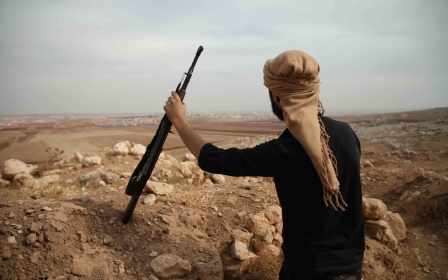Rebels fire shells from Syria buffer despite heavy arms pullout

Opposition fighters have fired mortar shells from a planned buffer zone in northwest Syria, in a deadly attack that threatens a deal to protect the last major rebel bastion from a government offensive.
The Russian-Turkish accord also provides for what President Vladmir Putin, who helped broker the deal, termed "radical fighters" to withdraw by Monday from the demilitarised zone ringing rebel-held areas in and around Idlib province.
But a monitor and AFP correspondent said on Sunday that no such fighters had been seen leaving the region yet.
The Syrian Observatory for Human Rights, a UK-based rights group, reported that "heavy mortar shells" were fired late on Saturday from the planned buffer area into government territory, killing two soldiers.
The deal agreed last month is only the latest in a string of truces throughout Syria's seven-year civil war, which has killed more than 360,000 and displaced millions.
It calls for setting up a horseshoe-shaped buffer zone around the Idlib region that would be free of heavy arms by 10 October and of "radical fighters" by 15 October.
Rebels and "radical fighters" had reportedly met the first deadline, with Turkish officials, armed factions and the Observatory reporting that the area was free of heavy-duty weaponry.
But the shells that hit an army position in Hama provinceon Saturday appear to have been fired in violation of the accord.
"This is the first clear violation of the deal since the heavy weapons were withdrawn. This area is supposed to be clear of heavy weapons, including mortar shells," said Observatory head Rami Abdurrahman.
He said intermittent government shelling had been hitting the planned buffer for days, but the deal does not require government forces to withdraw any of their weapons.
Syrian pro-government daily Al-Watan also reported rebel shelling, saying on Sunday that western parts of Aleppo province were being hit with "rocket fire and shelling with heavy weapons, which were supposed to be pulled out from the area".
A correspondent for the AFP news agency in western Aleppo reported mortar fire in the area after several days of quiet.
The Observatory said it was not clear which groups fired the mortars, as both the Turkish-backed National Liberation Front (NLF) and "radical" factions were present in the area.
The NLF, which holds just under half of the Idlib region and has welcomed the accord, did not immediately respond to AFP's request for comment on the shelling.
No 'radical' withdrawals
The lion's share of Idlib is held by Hay'at Tahrir al-Sham (HTS), an alliance led by former al-Qaeda members, as well as Hurras al-Deen and Ansar al-Islam.
Those fighters also control more than two-thirds of the planned buffer zone and are supposed to withdraw by Monday.
The Observatory said it had not monitored any withdrawals, and an AFP correspondent in Idlib also said no "radical" factions had moved any of their units in recent days.
Hurras al-Deen has publicly rejected the agreement, although it apparently withdrew its heavy arms from the area last week.
HTS, widely considered the most powerful force in Idlib, has not publicly commented on the accord but also quietly abided by its first deadline and re-stationed heavy arms elsewhere.
Persuading the militant factions to implement the deal's second half would be much more challenging, observers say.
In a recent report for the Turkey-based Omran Center, expert Nawar Oliver described HTS's approval as the deal's ultimate "test".
"If HTS acts as a spoiler to the agreement on the ground, this will probably lead to one of two scenarios: either Turkey and the NLF launch military action against HTS, or Russia will seize the opportunity with the support of the regime and its allies to enter Idlib," he said.
"The ramifications of that move could be vast," he added.
Syrian President Bashar al-Assad and other top government officials have warned that the Idlib deal was only a "temporary" measure.
On Friday, residents around Idlib received warning messages on their mobile phones from the Syrian army.
"Get away from the fighters. Their fate is sealed and near," one said.
Stay informed with MEE's newsletters
Sign up to get the latest alerts, insights and analysis, starting with Turkey Unpacked
Middle East Eye delivers independent and unrivalled coverage and analysis of the Middle East, North Africa and beyond. To learn more about republishing this content and the associated fees, please fill out this form. More about MEE can be found here.




